I'm searching a space of vectors of length 12, with entries 0, 1, 2. For example, one such vector is
001122001122. I have about a thousand good vectors, and about a thousand bad vectors. For each bad vector I need to locate the closest good vector. Distance between two vectors is just the number of coordinates which don't match. The good vectors aren't particularly nicely arranged, and the reason they're "good" doesn't seem to be helpful here. My main priority is that the algorithm be fast.
If I do a simple exhaustive search, I have to calculate about 1000*1000 distances. That seems pretty thick-headed.
If I apply Dijkstra's algorithm first using the good vectors, I can calculate the closest vector and minimal distance for every vector in the space, so that each bad vector requires a simple lookup. But the space has 3^12 = 531,441 vectors in it, so the precomputation is half a million distance computations. Not much savings.
Can you help me think of a better way?
Edit: Since people asked earnestly what makes them "good": Each vector represents a description of a hexagonal picture of six equilateral triangles, which is the 2D image of a 3D arrangement of cubes (think generalized Q-bert). The equilateral triangles are halves of faces of cubes (45-45-90), tilted into perspective. Six of the coordinates describe the nature of the triangle (perceived floor, left wall, right wall), and six coordinates describe the nature of the edges (perceived continuity, two kinds of perceived discontinuity). The 1000 good vectors are those that represent hexagons that can be witnessed when seeing cubes-in-perspective. The reason for the search is to apply local corrections to a hex map full of triangles...
